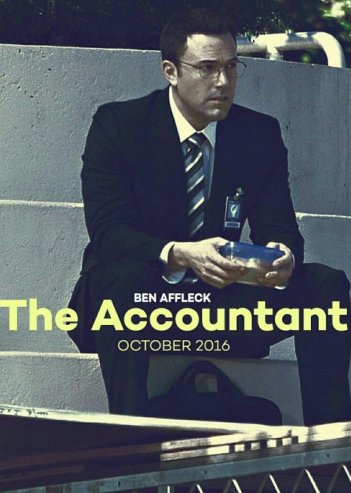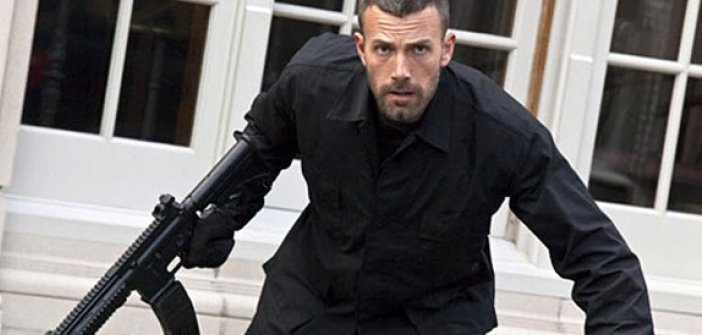Film Review | The Accountant, its Misconceptions of Autism, and Me
Just once, I want to see a movie about autistic people who are shit at maths.
Like me.
Yes, I have Asperger’s Syndrome. No, I will not go with you to Las Vegas on your J1 (one person asking me this was too many).
In any case, I am rubbish at maths. But if you were going by popular culture, you’d think autism is a superpower that makes you a mathematical genius. Even movies with relatively accurate portrayals of autism, like last year’s X+Y, build a plot around being great at maths. There are so many movies with dodgy portrayals of autism I could do a series on them.

For now, let us consider The Accountant. Ben Affleck negotiating the balance between gritty leading man and what Kirk Lazarus called “full retard”, plays the titular accountant Christian Wolff, an autistic man who, given that this is a Hollywood movie, is a maths genius. He is such a maths genius that he makes millions from cooking books for an assortment of criminal cartels, money launderers and, I think, terrorists at one point? He’s also exceptionally good at killing people, given his exposure to the criminal underworld and a strict upbringing from a military father that’s teased out through flashbacks. Did I say strict upbringing? I meant abusive upbringing, a whole can of worms I’m gonna open in just a moment.
But first, let’s look at The Accountant just in filmmaking terms. It’s okay. I mean, it’s SO not okay, but we’ll get to that. This is somewhere between The Equalizer and John Wick, in terms of movies about a cold-blooded anti-hero turning his powers against the bad guys. In between childhood flashbacks, Wolff is hired to audit a shady tech company who inevitably turn on him with hit squads. The pacing of this movie is very efficient right up until Wolff goes on the run. That’s when the flashbacks become a crutch to dump exposition rather than contextualise character as it had been doing.
A similar shift occurs when it comes to the action choreography. The first half of the movie has really inventive, engaging fights. For example, a pro-tip is shared with the audience; if someone pulls a knife on you, you can take your belt off and beat the absolute shit out of them with it. You can also, in certain locations, smash a sink into your assailant’s face (What is it with Ben Affleck and sinks lately?). But then the movie’s home invasion climax resorts to that rubbish Paul Greengrass aesthetic where you shake the camera as much as physically possible, such that you can no longer see what a dedicated stunt team spent months choreographing. The key to good action scenes is visual clarity on who’s doing what where, something this movie had appeared to grasp until this ending.

Now, what did the movie get right in its portrayal of autism?
Ben Affleck is good-looking, so they got that part right. I also liked how medically accurate a clinician’s explanation of autism was. I liked the depth given to non-verbal autistic people. I liked Anna Kendrick’s performance because it hints at the possibility she is also on the spectrum. I just wish the movie had been more explicit about it because it would have better illustrated that autism affects each person differently. Without portraying diversity in how the condition affects people, a passive viewer could develop misconceptions about autistic people from the movie where they’re mastermind criminal killers; harmful misconceptions that can further stigmatise an already-misrepresented group.
Which brings us to Christian Wolff. Seth Lee plays the younger Wolff and he is not good at portraying autism. His scenes mainly involve panic attacks which I’m familiar enough with to know that they don’t go from 0 to 100 in the space of a second. Without a gradual emotional journey the audience can relate to, autism appears like a freakshow where we scream at the top of our voice the exact moment we notice a misplaced detail.
As for Ben Affleck, for much of the film he carries a sullen expression that Others him. Many autistic people exhibit just as much variety in their facial expressions as neurotypicals (you boring non-autistic people) but this only comes across in certain scenes where he’s bonding with Anna Kendrick over maths or art. You can view that as touching that he can smile and open up with her or offensive that a person with mental health issues is “fixed” once they have romantic affection (Fuck You so fucking much, Silver Linings Playbook!); I’ll let you decide.
On the other hand, there’s a nuance to Ben Affleck’s performance I appreciate. There’s an early scene where Wolff is the socially-savvy one and a neurotypical couple in his “front” office are the ones being thick. Coming to him with financial troubles, they are offered a way to claim business tax credits from the wife’s art hobby but Wolff is the one frustrated by how slow they are to cop on to his semi-legal solution to their problems. This scene inverts the trope of autistic people having no social awareness so it gave me hopes that this movie wouldn’t be too bad; hopes that were then dashed by this movie’s biggest problem.

The childhood flashbacks reveal that Wolff’s mother abandoned her family because she found raising a son with autism too difficult. With the gruff father left alone to raise him as they move around the world for military postings, the father has a grain of decency to him in that he doesn’t want his son “to be taken advantage of” and spend his life living with a victim’s mentality. He decides he should achieve this end by intentionally exposing his son to sensory overload and stressful situations because the world won’t be an accommodating “sensory-friendly place”. This is a bit like pushing your kid out of a wheelchair and forcing them to crawl up a mountain, so they don’t develop a “victim’s mentality”.
For example, a flashback to Indonesia sees the father dispassionately reading a newspaper while his son fights a martial arts tutor. Martial arts can have developmental benefits for some autistic people, especially the Silat depicted here (popularised by The Raid movies) which emphasises a calm mindset and which I’m currently studying. But this instructor, a grown man, beats Wolff to the ground and then turns to the father to say his son has had enough. The father, ignoring the instructor’s advice, tells him to carry on with the lesson. Wolff gets back on his feet and unconvincingly says he’s okay to continue.
The father concludes that being a victim is a choice and that being aware of the ways society discriminates against you is exactly the same as having a “victim’s mentality”. So the best way to help his son is to victimise him. Not only does making Wolff a victim of his father’s child abuse undermine this garbled alt-right message, but as an isolated, self-harming criminal he ends up living like a victim anyway. Unless of course, you consider his formidable powers as an anti-hero a force for good when turned on the bad guys, which would imply that the father was right to abuse his disabled son. The movie certainly does.
What’s particularly insulting about all this is the director Gavin O’Connor’s glib response to criticism. After boasting the movie was met with approval by Autism Speaks, an openly eugenicist organisation not run by autistic people, O’Connor whined in an LA Times interview that,
“Someone is going to take issue with it. It’s just the way of the world now with social media and the Internet.”
Well, fuck you. You’re the one who spent years working on this movie and you’re gonna take that attitude? Compare that to directors like Mark Ruffalo and Tom Hooper when they were criticised for casting cis actors in trans roles. They responded with sensitivity, or at the very least, feigned sensitivity. Your cop-out is yet another alt-right fallacy? That because some internet criticism is spurious none of it can be legitimate?
Maybe I should consider this movie empowering and wish that I’d seen more movies growing up where an autistic role model murders lots of people. Or maybe Christian Wolff is to autistic people what Buffalo Bill is to trans people. No matter how much The Silence of the Lambs made it clear Buffalo Bill was not transgendered, that doesn’t mean certain people wouldn’t take away from it a monstrously skewed perception of trans people.
Are Wolff’s superpowers going to be recognised as a result of child abuse or as a result of autism? Because if it’s the latter, it perpetuates the stereotype autistic people all have special abilities, even potentially dangerous ones. If it’s the former, it’s encouraging that the audience will understand that distinction but it still leaves them with a movie that suggests child abuse was ultimately a good thing.
Those are the things I have to think about, along with my higher risk factor for anxiety and depression, discrimination from employers and trying to navigate Irish social life when it mainly revolves around noisy, crowded bars that neurotypicals are bafflingly comfortable in. On top of all that, it’s apparently going to be my job to dispel people’s misconceptions for them, which they get from movies like this. No, I’m not a victim. I’m just tired of movies telling me to stop being a victim while depicting victimhood as my inescapable fate.
But the rest of you go enjoy your movie.
The Accountant is in cinemas from Friday 4th November. Check out the trailer below.
[arve url=”https://www.youtube.com/watch?v=fkPJ3aENjvM” align=”center” maxwidth=”750"]
Featured Image Credit

